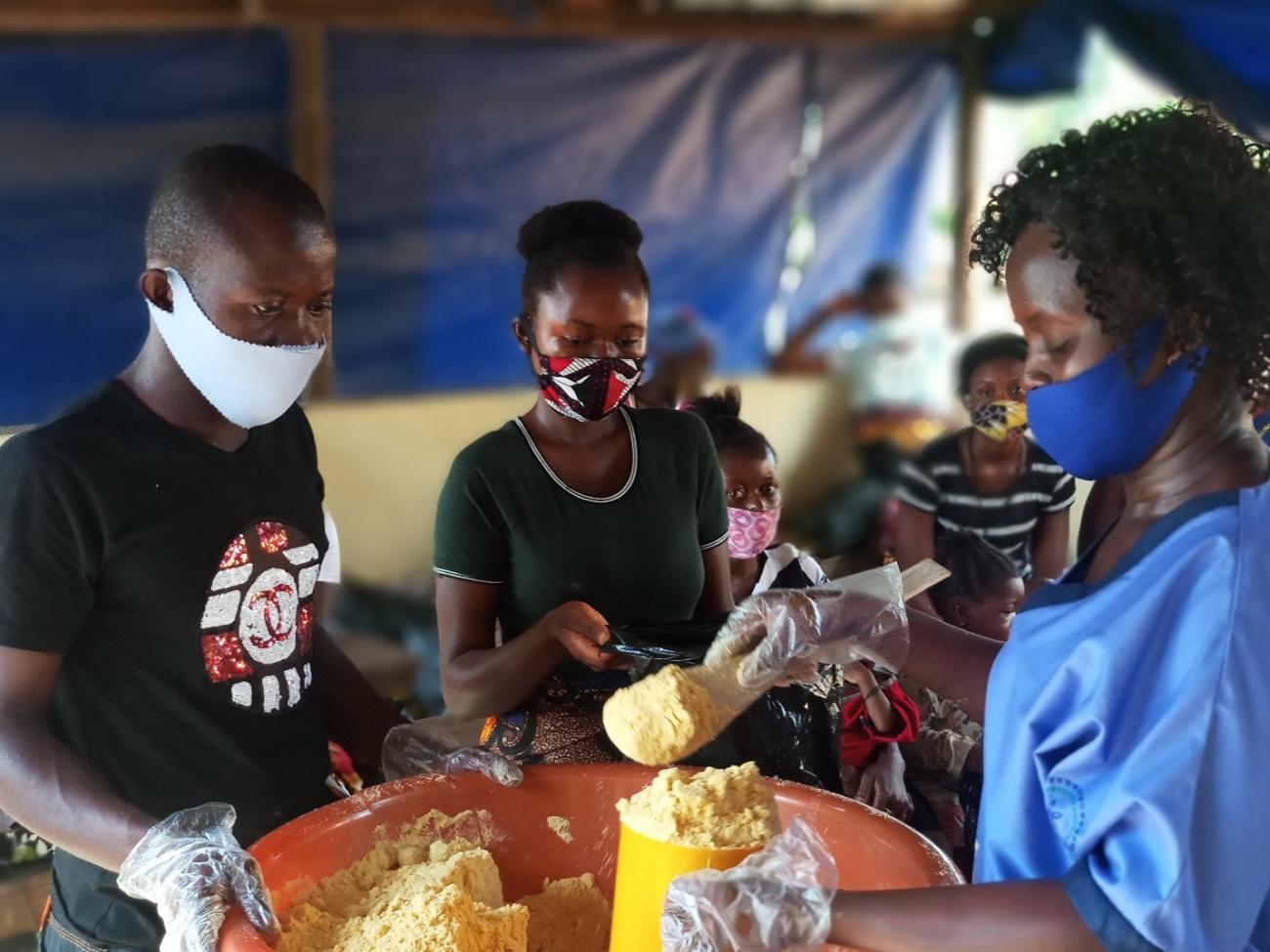Just as it was during the Ebola period when health centres were abandoned for fear of catching the disease, the COVID-19 crisis is no different. Getting the mothers and children back to the centres to access regular services has been challenging. In partnership with the Government of Sierra Leone, WFP is supporting children and mothers from the poorest households through a targeted supplementary feeding programme, reaching over 12,300 children and 50,600 mothers across the country.
A few months ago, at the height of the COVID-19 outbreak, the Bandajuma Health Centre like many others in the country was abandoned by mothers. “The women here were not coming to the health centre with their children, because they were afraid of catching the COVID-19 virus,” says Joe Sesay, the community health officer.
Twenty-five-year-old Cecilia Margai, a mother of three children had to temporarily stop visiting the clinic when the first COVID-19 index case was announced by the Government in March 2020. “Though I had a sick child, I was too afraid to visit the health centre,” said Cecilia.
Today, Cecilia has come to the Bandajuma Health Centre in the Pujehun district southern Sierra Leone to receive food supplies and other services for her one-year-four-month-old child Rashida, having walked a three-mile distance from her village, Gandorhun.
“Now the mothers are no longer afraid to come to the centre to access services and to receive food,” says Mr. Sesay. “The food attracts them to the health centre and every mother wants it for their sick child,” he added.
Jingles aired on community radio stations by WFP and partners have emphasized the safety of the health centres and the benefits mothers could derive from taking their children there.
Rashida’s father is a motorbike taxi driver, who has very limited income. As such, the family struggled, and Rashida was not feeding well and became severely malnourished.
“With the COVID-19 restrictions and its associated economic hardships like less income, it has not been easy for me, especially since the children’s father doesn’t see us often,” Cecilia said.
After a month of treatment through the health centre’s Outpatient programme for severely malnourished, Rashida improved and was moved to a complementary programme for the moderately malnourished. There, she continued to receive support until she reached the desired weight for her height. Through this programme, children like Rashida receive rations of super cereal plus —a highly nutritious corn-soya blend enriched with micronutrients.
Given the increased prevalence of moderately acute malnutrition (MAM) among Pregnant and Lactating Women, Adolescent Girls and children aged 6-59 months as confirmed by elevated monthly admission rates at Government health facilities, WFP with funding from Irish Aid introduced a nationwide MAM treatment project in collaboration with the Ministry of Health and Sanitation’s (MoHS) Directorate of Food and Nutrition (DFN). This is intended not only to prevent further deterioration of the nutritional status of the most vulnerable groups through the provision of specialized nutritious food but also to strengthen the capacity of almost 2,400 health workers.
“Rashida likes the food, and it has helped her to gain weight,” Cecilia proudly relates. “I feel happy receiving this assistance without which my child’s health would have been worse”.
The Bandajuma health centre is one of almost 793 supplementary feeding centres nationwide supported by WFP. Like many of these centres, it provides Social Behaviour Change Communication messages such as exclusive breastfeeding for infants, timely introduction of complementary foods in addition to vaccination, deworming, growth monitoring and supplementary feeding activities. These messages serve to reinforce key nutrition messages during the COVID-19 outbreak, whilst also contributing toward increased awareness of Infection Prevention and Control measures.
The country has one of the highest maternal, infant and young child mortality rates globally and a population characterized by high malnutrition rates. The 2019 Sierra Leone Demographic and Health Survey revealed that 30 percent of children in Sierra Leone under age 5 are stunted (short for their age), 5 percent are wasted (thin for their height), 14 percent are underweight (thin for their age). Inappropriate feeding practices on breastfed or weaned children and low level of exclusive breastfeeding remain a large malnutrition factor, with 46 percent of children under 6 months not exclusively breastfed according to the same survey.
Over 12,300 Children and 50,600 mothers are benefiting from the MAM treatment programme across the country. The programme is vital to reducing malnutrition and attracting mothers to health centres. Enriched foods provide vulnerable children with the nutrients they need to thrive.




